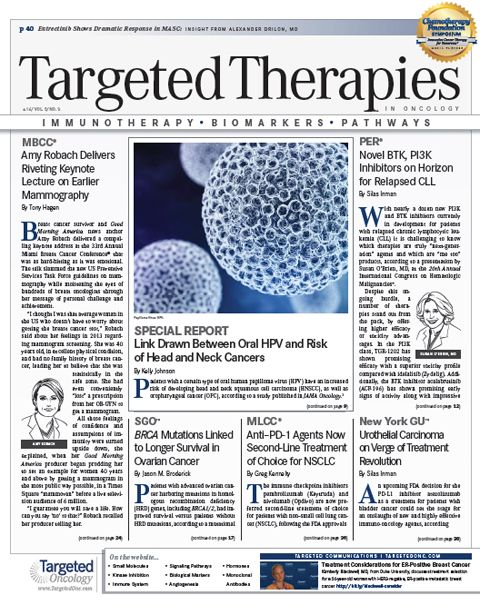Extended RESONATE Data Illuminates Ibrutinib's Benefits in High-Risk CLL
Extended follow-up data continue to demonstrate the efficacy and tolerability of ibrutinib in previously treated patients with chronic lymphocytic leukemia, including those with high-risk gene mutations and prognostic features.
Jennifer R. Brown, MD, PhD, director, Chronic Lymphocytic Leukemia Center, Dana-Farber Cancer Institute

Jennifer R. Brown, MD, PhD
Extended follow-up data continue to demonstrate the efficacy and tolerability of ibrutinib (Imbruvica) in previously treated patients with chronic lymphocytic leukemia (CLL), including those with high-risk gene mutations and prognostic features, according to a poster presented at the20th AnnualInternational Congress on Hematologic Malignancies®.
In the 18-month analysis of the phase III RESONATE study, which was pivotal in the full FDA approval for the BTK inhibitor, treatment with ibrutinib reduced the risk of progression or death by 89% versus ofatumumab. Additionally, despite crossover, ibrutinib improved overall survival (OS) by 52% compared with ofatumumab (HR, 0.475; 95% CI, 0.284-0.795) with an 18-month OS rate of 86% in the BTK inhibitor arm.
“We've reported now on 18-month follow-up of the RESONATE trial, which is still relatively early, but we see that in the ibrutinib arm, 76% of patients remain progression-free on ibrutinib,” said lead author Jennifer R. Brown, MD, PhD, director, Chronic Lymphocytic Leukemia Center, Dana-Farber Cancer Institute. “We looked at some of the high-risk features, and within the ibrutinib arm there is presently no differences between the progression-free survival and the response rates in those high risk features.”
The phase III study randomized 391 patients with CLL and small lymphocytic leukemia (SLL) in a 1:1 ratio to either ibrutinib (n = 195) or ofatumumab (n = 196). Oral ibrutinib was administered at 420 mg daily and intravenous ofatumumab was administered initially at 300 mg in the first cycle followed by 2000 mg in 11 doses over 24 weeks. Following an interim analysis, the study was unblinded and 123 patients (63%) in the ofatumumab arm crossed over to receive ibrutinib.
Patient characteristics were balanced between the two arms. The median age of patients was 67 years, and approximately 40% were ≥70. Patients in the ibrutinib arm received a median of 3 prior therapies, whereas those in the ofatumumab arm had received a median of 2 prior therapies. Del17p and Del11q were present in a third of patients each.IGHVwas unmutated in 73% of those in the ibrutinib arm and for 63% in the ofatumumab group.
Median progression-free survival (PFS) in the ibrutinib arm was not reached compared with 8.1 months with ofatumumab (HR, 0.106; 95% CI, 0.075-0.151;P<.0001). The 18-month PFS rate was 76% with ibrutinib versus 8% with ofatumumab (P<.001).
The objective response rate (ORR) with ibrutinib was 90% versus 25% with ofatumumab (P<.0001). Overall, 13 patients achieved a complete response (CR) or CR with incomplete hematologic recovery (CRi) in the ibrutinib arm versus 1 with ofatumumab. Median time to CR/CRi with ibrutinib was 11 months.
“The interesting feature is that most do not have complete remissions, the complete remission rate is low, but the partial remissions they have stay stable for an extended duration, and they do tend to improve over time for most of the patients,” said Brown.
A similar PFS advantage was observed across all subgroups within the study, including gene mutations. In the del11q group, the 12-month PFS was 89% versus 8% with ofatumumab (P<.01). In theIGHVunmutated group, the 12-month PFS was 86% versus 12% for ibrutinib and ofatumumab, respectively (P<.05).
NOTCH1mutations were associated with an inferior response to ofatumumab. In this group, the 12-month PFS rate with ibrutinib was 83% versus 11% with ofatumumab (P= .0064). In theTP53-mutated and unmutated groups, the 12-month PFS rates with ibrutinib were 85% and 91% versus 17% and 23% in the ofatumumab arm, respectively.
In those withBIRC3mutations, the 12-month PFS rate with ibrutinib was 100% versus 0% with ofatumumab, although there were too few patients to demonstrated statistical significance. Additionally, there were too few patients withMYD88mutations to draw a concrete conclusion.
Those treated with just 1 prior therapy experienced a significantly better response with ibrutinib versus those treated with >1 prior therapy (HR, 3.294; 95% CI, 1.019-10.65;P= .0348). The ORR with ibrutinib in those who received 1 prior therapy was 100% versus 81% and 79% for those treated with 2 or ≥3 prior therapies, respectively (P= .003).
Dose reductions due to adverse events (AEs) were required for 8% of patients in the ibrutinib arm, and 7% discontinued ibrutinib due to AEs. The majority of AEs reported in the ibrutinib arm were grade 1 in severity. The most frequently reported bleeding AEs with ibrutinib, which were primarily grade 1, were an increased tendency to bruise, petechiae, and contusion.
There was one event each of grade 3 epistaxis and spontaneous hematoma and one grade 4 subdural hematoma. Atrial fibrillation occurred in 7% (3.6% grade 3) and hypertension occurred in 12% of patients (6.2% grade 3) treated with ibrutinib. Additionally, patients experienced grade 3/4 thrombocytopenia, pneumonia, and neutropenia.
“Ibrutinib is a highly effective therapy in refractory CLL. It is generally well-tolerated, with about 20% of patients going off for various reasons, but many patients stay on and have extended disease control,” said Brown.
Ibrutinib has gained several indications for patients with CLL/SLL. Most recently, the FDA approved frontline ibrutinib as a treatment for patients with CLL. The agent is also specifically indicated for patients with pretreated mantle cell lymphoma and Waldenström's macroglobulinemia.
Brown JR, Pagel JM, Hillmen P, et al. Updated analysis of the efficacy of ibrutinib vs. ofatumumab in genetic subgroups and overall safety in the phase 3 RESONATE trial in patients with previously treated chronic lymphocytic leukemia/small lymphocytic lymphoma (CLL/SLL). Presented at: 20th Annual International Congress on Hematologic Malignancies; March 1820, 2016; Miami Beach, FL. Poster #386.
